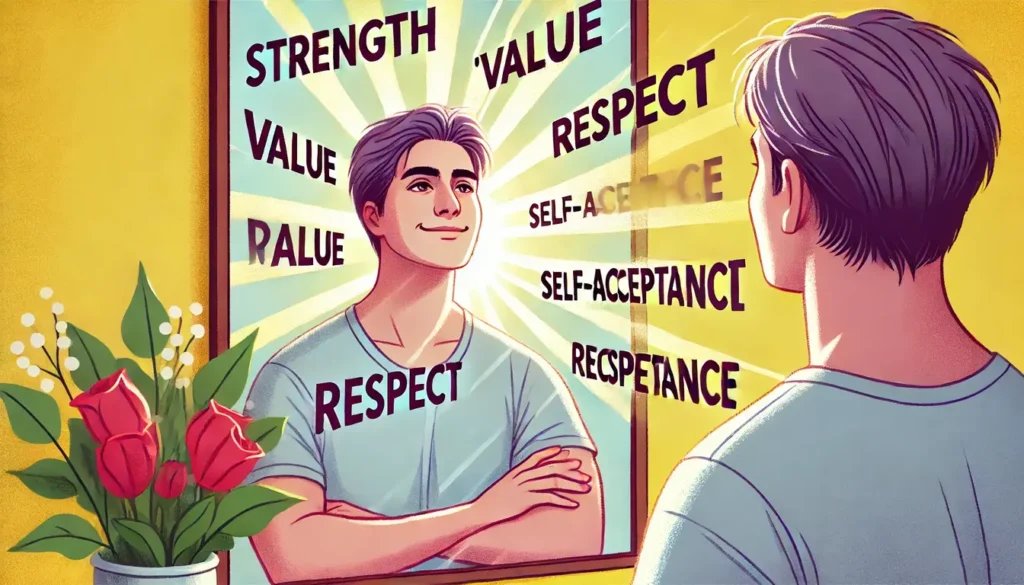Imagine unlocking your full potential simply by embracing a single word: worthy. In a world where external validation and achievements often overshadow our true selves, the concept of worthiness stands as a beacon of inner strength and self-acceptance. Worthiness is more than just a feeling; it is a profound realization that you are valuable, deserving, and capable, irrespective of external circumstances. Worthy: How This Power Word Can Make You Better can help you realize your full potential, fostering a deep sense of self-acceptance and inner strength.
The power word “worthy” can transform lives, reshape mindsets, and propel individuals toward personal growth and self-worth. By understanding and integrating this concept into your daily life, you can tap into a wellspring of potential and live a more fulfilling, authentic life.
Brené Brown, a renowned researcher and author, captures the essence of worthiness with her powerful statement: “Worthiness doesn’t have prerequisites.” This means that every individual, regardless of their circumstances or achievements, possesses inherent worth. Embracing this idea can lead to profound changes in how we perceive ourselves and interact with the world.
In this article, we will delve into the multifaceted nature of worthiness. We’ll explore its psychological foundations, its impact on various aspects of life, and practical strategies for building a robust sense of self-worth. By the end, you’ll understand why worthiness is not just a concept but a transformative power word that can unlock a wealth of potential and lead to a more fulfilling and empowered life.

Understanding the Concept of Worthiness
Worthiness, at its core, is the belief that you deserve love, respect, and positive experiences. It means knowing your value comes from within and doesn’t depend on what you achieve, how you look, or your social status. Dr. Kristin Neff, an expert in self-compassion research, describes self-worth as “
a stable sense of oneself as a fundamentally good, capable, and worthwhile person.
Here are the key aspects of worthiness:
- Self-Acceptance: This means embracing both your strengths and weaknesses. It’s about loving yourself for who you are, not just for what you can do.
- Intrinsic Value: This is recognizing that you have worth simply because you are a human being. Your value is not something you have to earn; it’s already inside you.
- Unconditional Positive Regard: This involves maintaining a positive view of yourself no matter what happens. It means believing in your goodness, even when things go wrong.
- Resilience: This is the ability to keep believing in your worth even when you face challenges or setbacks. It’s about bouncing back and not letting tough times shake your sense of self-worth.
Understanding worthiness is crucial because it forms the foundation of how we see ourselves. It influences our actions, how we interact with others, and our overall well-being. When we feel worthy, we are more likely to make healthy choices, build strong relationships, and feel happy and fulfilled.

The Psychology Behind Feeling Worthy
Understanding the psychology behind feeling worthy helps us see why it’s so important. Several key theories explain this:
Self-Determination Theory
According to this theory, which psychologists Edward Deci and Richard Ryan developed, humans have three basic psychological needs:
- Autonomy: This means being the boss of your own life. When you feel like you can make your own choices and control your actions, you feel more worthy.
- Competence: This is about feeling like you’ve got skills. When you believe you can do things well, it boosts your sense of worth.
- Relatedness: This means connecting with others. Feeling close to people and knowing you belong makes you feel valued and worthy.
When these needs are met, you feel more motivated and worthy. As Deci and Ryan say, “To be autonomous means to act in accord with one’s self—it means feeling free and volitional in one’s actions.”
Attachment Theory
John Bowlby created this theory, which looks at how your childhood relationships affect your sense of worth as an adult. If your parents treated you with respect and made you feel important, you are more likely to grow up with a strong sense of self-worth. On the other hand, if they make you feel unimportant, it can lead to low self-worth.
For example, think about how you felt when your parents praised you or showed you love. Those moments build a sense of worth that stays with you into adulthood. Bowlby said,
“The initial relationship between oneself and others serves as a blueprint for all future relationships.”
Cognitive-Behavioral Theory
This theory focuses on how our thoughts and beliefs shape our emotions and behaviors. If you have negative thoughts about yourself, you are likely to have low self-worth. But if you practice positive self-talk, you can boost your self-worth.
For instance, telling yourself, “I am capable and valuable,” can help you feel more worthy. It’s like a cycle: positive thoughts lead to positive feelings, which lead to positive actions.
Neuroscience and Self-Worth
Neuroscience research has also shown how the brain plays a role in self-worth. The prefrontal cortex, which is like the brain’s CEO, is heavily involved in how you see yourself. When you feel worthy, your brain releases feel-good chemicals like dopamine and serotonin. These neurotransmitters make you feel happy and motivated.
In other words, feeling worthy makes your brain happy. As neuroscientist Dr. Alex Korb explains,
“Sometimes, the simple act of looking for things to be grateful for can be a great boost to your mood.”
By understanding these psychological roots, we can see how feeling worthy is not just about emotions but also about how our minds and brains work together.

The Impact of Worthiness on Personal Growth
Feeling worthy can be a powerful motivator for personal growth and development. When you believe in your value, you are more likely to:
Set and Pursue Meaningful Goals
When you feel worthy, you believe you deserve to achieve great things. This belief encourages you to set goals that are important to you and work hard to reach them.
As Les Brown says,
“You are never too old to set another goal or dream of a new one.”
Believing in your worth helps you strive for better, regardless of age or situation.
Take Calculated Risks and Embrace Challenges
A strong sense of worthiness gives you the confidence to take risks and face challenges. You know that even if you fail, your value doesn’t change. This mindset allows you to step out of your comfort zone and try new things.
As Wayne Gretzky famously said, “You miss 100% of the shots you don’t take.” Feeling worthy helps you take those important shots in life.
Develop Resilience in the Face of Setbacks
When you believe in your worth, you are better able to bounce back from setbacks. You understand that failures and challenges are just part of the journey, not a reflection of your value. This resilience helps you keep going, even when things get tough.
As J.K. Rowling put it, “Rock bottom became the solid foundation on which I rebuilt my life.” Your sense of worth helps you find strength in difficult times.
Cultivate Authentic Relationships
Worthiness helps you build real, meaningful relationships. When you value yourself, you attract people who respect and appreciate you. You are also more likely to treat others with kindness and respect, creating strong, positive connections.
As Brené Brown said,
“Connection is why we’re here; it is what gives purpose and meaning to our lives.”
Feeling worthy helps you form those valuable connections.
Engage in Self-Care and Prioritize Well-Being
When you know you are worthy, you take better care of yourself. You understand that your well-being is important, so you make time for self-care and healthy habits. This can include everything from eating well and exercising to taking time to relax and do things you enjoy.
As Arianna Huffington said, “We need to accept that we won’t always make the right decisions, that we’ll screw up royally sometimes—understanding that failure is not the opposite of success, it’s part of success.” Feeling worthy helps you take care of yourself and stay strong on your path to success.
In summary, a strong sense of worthiness empowers you to grow and improve in many areas of your life. By believing in your value, you can set and achieve goals, take risks, build resilience, form authentic relationships, and prioritize your well-being.
Recognizing Signs of Low Self-Worth
To build a strong sense of worthiness, it’s important to notice signs of low self-worth. Here are some common signs and how to recognize them:
Constant Self-Criticism and Negative Self-Talk
If you often criticize yourself or have negative thoughts about yourself, it could be a sign of low self-worth. For example, you might think, “I’m not good enough,” or “I always mess things up.”
As Eckhart Tolle says, “Awareness is the greatest agent for change.” Noticing these thoughts is the first step to changing them.
Difficulty Accepting Compliments or Praise
People with low self-worth often struggle to accept compliments or praise. When someone says something nice about you, do you brush it off or think they don’t mean it? Accepting compliments can be hard if you don’t believe you’re worthy of them.
Fear of Failure or Success
Fear of failure is common, but did you know fear of success can also be a sign of low self-worth? You might worry that if you succeed, people will expect more from you, or you’ll have to prove yourself again and again. This fear can hold you back from trying new things.
People-Pleasing Behaviors
Do you often do things just to make others happy, even if you don’t want to? This is called people-pleasing, and it’s a sign of low self-worth. You might feel that if you don’t make others happy, they won’t like you or think you’re good enough.
Difficulty Setting and Maintaining Boundaries
Setting boundaries means saying no when you need to and protecting your own needs and feelings. If you find it hard to say no or let others know when they’ve crossed a line, it might be because you don’t feel worthy of standing up for yourself.
Comparing Oneself Unfavorably to Others
Do you often compare yourself to others and feel like you don’t measure up? This habit can make you feel worse about yourself. Remember, everyone’s journey is different, and comparing yourself to others is not fair to you.
Perfectionism and Fear of Making Mistakes
If you feel like you have to be perfect and are afraid of making mistakes, this could be a sign of low self-worth. Perfectionism can stop you from trying new things or enjoying your successes because you’re always focused on what you didn’t do perfectly.
Identifying these patterns is the first step towards changing them. By being aware of these signs, you can start to address and transform them, building a stronger sense of worthiness in the process. As Eckhart Tolle says, “Awareness is the greatest agent for change.” Recognizing these signs in yourself is a powerful way to begin your journey to feeling more worthy.
Strategies to Cultivate a Sense of Worthiness
Building a strong sense of worthiness takes time, effort, and self-reflection. Here are some effective strategies to help you feel more worthy:
Practice Self-Compassion
Treat yourself with the same kindness and understanding you would offer a good friend. If you make a mistake, don’t be too hard on yourself. Instead, say something kind of like, “It’s okay to make mistakes. Everyone does.” Being kind to yourself helps you feel more worthy.
Challenge Negative Self-Talk
When you notice negative thoughts about yourself, try to change them. For example, if you think, “I’m not good at this,” change it to, “I’m learning, and I will get better.” Recognizing and changing these thoughts can help you feel better about yourself.
Set and Enforce Healthy Boundaries
Learn to say no and prioritize your needs. If someone asks you to do something that you don’t want to do or that will make you feel stressed, it’s okay to say no. Setting boundaries helps you take care of yourself and feel more in control.
Engage in Activities That Bring Joy and Fulfillment
Do things that make you happy and make you feel good about yourself. This could be a hobby, like painting, playing a sport, or spending time with friends. Doing activities you enjoy helps you feel alive and competent.
Practice Gratitude
Regularly think about the good things in your life and what you are thankful for. This could be simple things like having a cozy bed or a friend who makes you laugh. As Maya Angelou said,
“You alone are enough. You have nothing to prove to anybody.”
Being grateful helps you appreciate your life and your worth.
Seek Support
Surround yourself with people who make you feel good about yourself. Spend time with friends and family who affirm your worth. If you need extra help, don’t be afraid to talk to a counselor or therapist. They can provide support and help you build your sense of worthiness.
Embrace Imperfection
Remember that making mistakes is a natural part of being human. Instead of getting upset when you make a mistake, see it as an opportunity to learn and grow. No one is perfect, and that’s okay. Embracing imperfection helps you accept yourself as you are.
By practicing these strategies, you can develop a stronger sense of worthiness. Remember, feeling worthy is about believing in your values and treating yourself with the respect and kindness you deserve.

The Role of Worthiness in Relationships
Having a strong sense of self-worth is crucial for building healthy and fulfilling relationships. When you feel worthy, you are more likely to:
Communicate Your Needs and Boundaries Effectively
When you know your worth, you can clearly express what you need and set boundaries with others. This means telling people what you are comfortable with and what you are not. For example, you might say, “I need some time alone right now,” or “Please don’t talk to me like that.” Communicating your needs helps you feel respected and understood.
Choose Partners and Friends Who Treat You with Respect
Feeling worthy helps you choose people who respect and value you. You are more likely to pick friends and partners who are kind, supportive, and treat you well. As relationship expert Esther Perel says, “The quality of our relationships determines the quality of our lives.” Good relationships start with choosing people who appreciate you.
Avoid Toxic or Abusive Relationships
When you have self-worth, you are less likely to stay in relationships that are harmful or abusive. You recognize that you deserve to be treated with kindness and respect, and you won’t tolerate being mistreated. This helps you avoid relationships that can hurt your well-being.
Give and Receive Love More Freely
Feeling worthy allows you to give love without fear and to accept love from others. You understand that you deserve love and that loving others is a wonderful part of life. This makes your relationships more open and genuine. As Maya Angelou said, “You alone are enough. You have nothing to prove to anybody.” This belief helps you embrace love fully.
Handle Conflicts and Disagreements Constructively
Self-worth helps you deal with conflicts in a healthy way. When disagreements arise, you can discuss them calmly and find solutions without feeling threatened or defensive. You understand that conflicts are a natural part of relationships and can be resolved through respectful communication.
By focusing on self-worth, you set the tone for all your relationships. When you value yourself, you create a foundation for healthy, respectful, and loving connections with others. As Esther Perel emphasizes, “The quality of our relationship with ourselves sets the tone for all other connections.”
Worthiness in Professional Settings
Feeling worthy at work can greatly influence your career path and how happy you are with your job. People who believe in their worth are more likely to:
Advocate for Themselves and Their Ideas
When you feel worthy, you are confident in sharing your ideas and standing up for what you believe in. You know that your thoughts and contributions matter, so you speak up in meetings and discussions. This helps you get noticed and make a positive impact at work.
Seek Out Challenging Opportunities and Promotions
Believing in your worth makes you more likely to pursue new opportunities. You might apply for a promotion, take on a challenging project, or learn new skills. You know you can handle these challenges, and this can lead to career growth. As Warren Buffett advises, “You can’t produce a baby in one month by getting nine women pregnant. It just doesn’t work that way.” This means that success takes time and patience, and believing in yourself is key.
Contribute Meaningfully to Team Projects
When you feel worthy, you contribute your best to team projects. You know your ideas and efforts are valuable, so you work hard and help your team succeed. Your confidence can inspire others and improve the overall performance of the team.
Handle Feedback and Criticism Constructively
People with a strong sense of worthiness can take feedback and criticism in stride. Instead of feeling hurt or defensive, they see it as an opportunity to learn and improve. This helps them grow and get better at their jobs.
Maintain a Healthy Work-Life Balance
Feeling worthy helps you recognize the importance of balancing work and your personal life. You know that taking care of yourself is just as important as working hard. This means you make time for relaxation, hobbies, and spending time with loved ones, which keeps you happy and healthy.
Believing in your worth is crucial for professional growth and satisfaction. When you know your value, you are more likely to advocate for yourself, seek new opportunities, contribute effectively, handle feedback well, and maintain a healthy work-life balance. As Warren Buffett’s quote reminds us,
success takes time, and believing in your worth is a big part of that journey.
Overcoming Societal Pressures and Cultivating Self-Worth
In today’s world, it’s easy to feel pressured by society and lose sight of our worth. Social media, in particular, can make us compare ourselves to others and feel like we don’t measure up. Here are some ways to build your self-worth despite these pressures:
Practice Digital Detox Regularly
Take breaks from social media and digital devices. Spending too much time online can make you feel overwhelmed and stressed. A digital detox can help you focus on real-life connections and activities that make you feel good about yourself.
Curate Your Social Media Feed to Include Positive, Uplifting Content
Follow accounts that inspire and uplift you. Choose content that makes you feel happy and motivated, rather than stressed or inadequate. Seeing positive messages can help boost your self-worth.
Recognize That Social Media Often Presents a Curated, Unrealistic Version of Life.
Remember that what you see on social media is often not real. People usually share their best moments and hide their struggles. Recognize that these perfect-looking lives are not the full story. Understanding this can help you feel better about your own life.
Focus on Your Personal Growth Rather Than Comparing Yourself to Others
Concentrate on your journey and progress. Everyone has different paths and timelines. Instead of comparing yourself to others, celebrate your achievements and improvements, no matter how small. As Amy Cuddy says, “Don’t fake it till you make it. Fake it till you become it.” Act with confidence, and over time, you will genuinely feel more confident.
Challenge Societal Norms and Expectations That Don’t Align with Your Values
Think about what truly matters to you and stand by those values. Society often has expectations that might not fit who you are. Challenge these norms and stay true to yourself. This will help you build a strong sense of self-worth based on your own beliefs and values.
By following these steps, you can overcome societal pressures and build a strong sense of self-worth. Remember, your value comes from within, not from how you compare to others or meet external expectations.
As Amy Cuddy advises, acting with confidence can help you become genuinely confident over time.

The Connection Between Worthiness and Mental Health
Feeling worthy is very important for your mental health. When you believe in your value, it can help protect you from many mental health issues. Research has shown that people with high self-worth are less likely to experience:
Depression and Anxiety
People who feel worthy are less likely to suffer from depression and anxiety. When you believe in your value, you are more likely to feel happy and less stressed. Knowing your worth helps you stay positive even when things are tough.
Eating Disorders
A strong sense of worthiness can protect you from eating disorders. When you feel good about yourself, you are less likely to harm your body by overeating or starving yourself. Self-worth helps you take care of your body in a healthy way.
Substance Abuse
Feeling worthy can prevent substance abuse. When you believe in your worth, you are less likely to use drugs or alcohol to cope with problems. Instead, you find healthier ways to deal with stress and challenges.
Suicidal Ideation
High self-worth can also protect you from having thoughts of suicide. When you know you are valuable, you are less likely to feel hopeless. Believing in your worth can give you the strength to seek help and keep going, even when life is hard.
On the other hand, building self-worth can lead to many positive mental health outcomes, including:
Increased Resilience
Self-worth makes you more resilient, meaning you can bounce back from setbacks more easily. You understand that challenges do not define you and that you can overcome them. As Viktor Frankl, a psychiatrist, and Holocaust survivor, said, “Everything can be taken from a man but one thing: the last of the human freedoms—to choose one’s attitude in any given set of circumstances, to choose one’s way.”
Better Stress Management
When you feel worthy, you handle stress better. You know that you can manage difficulties and find solutions. This confidence helps you stay calm and focused during stressful times.
Higher Levels of Life Satisfaction
Feeling worthy leads to higher levels of life satisfaction. You appreciate your achievements and feel content with your life. Knowing your worth helps you enjoy life more and feel fulfilled.
Improved Overall Well-Being
A strong sense of worthiness improves your overall well-being. You take better care of your mental and physical health. This leads to a happier, healthier, and more balanced life.
By understanding the connection between worthiness and mental health, you can see how important it is to believe in your values. As Viktor Frankl’s quote reminds us, maintaining a sense of inner worth can help you stay strong even in the most challenging circumstances.
Inspiring Examples of Individuals Who Embraced Their Worth
Throughout history, many people have overcome difficulties by believing in their worth. Here are some inspiring examples:
Nelson Mandela
Nelson Mandela spent 27 years in prison, but he never lost his dignity or sense of purpose. He believed in his worth and the worth of his people. After being released, he led South Africa towards reconciliation and democracy. Mandela’s belief in his worth helped change a nation. He once said, “I am not a saint unless you think of a saint as a sinner who keeps on trying.”
Malala Yousafzai
Malala Yousafzai was shot by the Taliban because she stood up for girls’ education. Despite this, she continued to fight for the right of girls to go to school. Malala became the youngest person to win the Nobel Prize. Her story shows that believing in your worth can help you make a big difference in the world. She said, “One child, one teacher, one book, and one pen can change the world.”
Stephen Hawking
Stephen Hawking was diagnosed with a serious disease that affected his body, but he never let it define his worth. He made important discoveries in physics and cosmology. Hawking showed that physical limitations do not determine your value. He inspired many by saying, “However difficult life may seem, there is always something you can do and succeed at.”
Oprah Winfrey
Oprah Winfrey had a difficult childhood, but she believed in her worth and worked hard to build a media empire. She became one of the most influential women in the world. Oprah always emphasized the importance of self-worth, saying, “You alone are enough. You have nothing to prove to anybody.”
These individuals remind us that believing in our worth can lead to amazing achievements and positive changes in the world. By embracing their worth, they overcame great challenges and inspired many people.
Practical Exercises to Boost Your Sense of Worth
To help you feel more worthy, here are some practical exercises you can do:
Daily Affirmations
Start each day by saying positive affirmations to yourself. These are encouraging statements that remind you of your worth. For example, you might say, “I am worthy of love and respect” or “My worth is not based on my accomplishments.” These daily affirmations can help you start the day with a positive mindset.
Gratitude Journaling
Regularly write down things you are grateful for, including aspects of yourself. This can be anything from your kindness to your ability to solve problems. Keeping a gratitude journal helps you focus on the positive parts of your life and appreciate your worth.
Acts of Self-Care
Take time to do things that nurture your physical, emotional, and mental well-being. This could include activities like taking a relaxing bath, going for a walk, reading a book, or practicing meditation. Self-care is important for maintaining a healthy sense of worth.
Celebrate Small Wins
Acknowledge and celebrate your accomplishments, no matter how small they may seem. Did you finish a task at work or help a friend? Celebrate these achievements. Recognizing your successes helps you build confidence and feel more worthy.
Volunteer or Help Others
Contributing to your community can reinforce your sense of value and purpose. Volunteering or helping others makes you feel good about yourself and shows you that your actions matter. As Winston Churchill said,
“We make a living by what we get, but we make a life by what we give.”
Create a “Worth Board.”
Similar to a vision board, create a collage of images, quotes, and personal mementos that remind you of your worth. This “worth board” can include pictures of happy moments, quotes that inspire you, and items that hold special meaning. Seeing this board every day can boost your sense of self-worth.
Practice Saying “No”
Politely decline requests or invitations that don’t align with your values or priorities. Saying “no” helps you set boundaries and prioritize your own needs. It shows that you respect yourself and your time. As author and speaker Steve Jobs said,
“It’s only by saying ‘no’ that you can concentrate on the things that are important.”
By doing these exercises regularly, you can cultivate a stronger sense of worthiness and lead a more fulfilling life.
Conclusion
Summary
Embracing the power word “worthy” can change every part of our lives. By recognizing that we have value, challenging negative thoughts about ourselves, and working on building self-worth, we can reach our full potential and live more fulfilling lives. The journey to feeling worthy is ongoing and can be challenging, but it is one of the most important steps in personal growth.
Encouragement
Embracing the power word “worthy” can change every part of our lives. By recognizing that we have value, challenging negative thoughts about ourselves, and working on building self-worth, we can reach our full potential and live more fulfilling lives. The journey to feeling worthy is ongoing and can be challenging, but it is one of the most important steps in personal growth, helping us become more confident, competent, and empowered individuals.
In the words of Carl Rogers, the founder of humanistic psychology, “The curious paradox is that when I accept myself just as I am, then I can change.” This powerful insight shows the transformative potential of embracing our worthiness. Through self-acceptance, we find the strength and motivation to grow, evolve, and become the best versions of ourselves.






